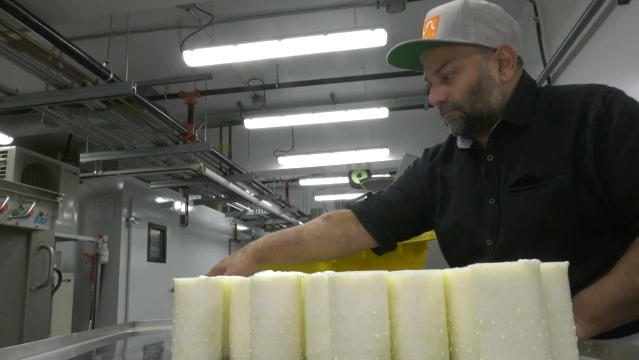
Former scientist turned cheesemaker, Aditya Raghavan at Meuwly's Artisan Food Market in Edmonton.
Andrea Dion
CTVNewsEdmonton.ca
Digital Producer
Updated Jan. 31, 2022
A former scientist turned artisan cheesemaker is on a mission to broaden the palates of Albertans.
About 10 years ago, Aditya Raghavan decided he wanted to make a change from the lab to the kitchen. And while the career change may seem unlikely to some, Raghavan said his physics background only helped him better understand the dairy industry.
“There is a lot of biochemistry involved in dairy fermentation,” he noted.
“It’s very interesting to apply your scientific training to those aspects, I didn’t necessarily get trained in that stuff but I could easily sort of grasp it because of my scientific training.”
But, what led to the new found passion for cheese? Experimenting at home.
“I was always passionate about food,” he recalled.
“I didn't know how to contribute meaningfully so I started going and working on farms and learning more about cheesemaking.”
Raghavan said he didn’t have a place to call home for about five years and made a number of personal sacrifices along the way in order to pursue his dream and learn more about the “world of dairy.”
During that time, he travelled to France, Germany, Italy and India to fully immerse himself in the art of cheese production.
“There’s a big disconnect between what the traditional European way of consuming cheese is as opposed to here,” he explained.
“It’s an experience when you go eat it there and it’s accessible. You just pick up a wheel and enjoy it at home.”
Updated Jan. 31, 2022
A former scientist turned artisan cheesemaker is on a mission to broaden the palates of Albertans.
About 10 years ago, Aditya Raghavan decided he wanted to make a change from the lab to the kitchen. And while the career change may seem unlikely to some, Raghavan said his physics background only helped him better understand the dairy industry.
“There is a lot of biochemistry involved in dairy fermentation,” he noted.
“It’s very interesting to apply your scientific training to those aspects, I didn’t necessarily get trained in that stuff but I could easily sort of grasp it because of my scientific training.”
But, what led to the new found passion for cheese? Experimenting at home.
“I was always passionate about food,” he recalled.
“I didn't know how to contribute meaningfully so I started going and working on farms and learning more about cheesemaking.”
Raghavan said he didn’t have a place to call home for about five years and made a number of personal sacrifices along the way in order to pursue his dream and learn more about the “world of dairy.”
During that time, he travelled to France, Germany, Italy and India to fully immerse himself in the art of cheese production.
“There’s a big disconnect between what the traditional European way of consuming cheese is as opposed to here,” he explained.
“It’s an experience when you go eat it there and it’s accessible. You just pick up a wheel and enjoy it at home.”
'A NATURAL FIT'
Raghavan told CTV News Edmonton he never grew up “fascinated” by cheese. But developed a love for it when he witnessed “the rich connection with the farm that’s involved.”
This is also why he only uses organic Alberta products when making his cheeses.
“Only the highest quality, always.”
Eventually, when Raghavan returned to Edmonton, he fully immersed himself in the food industry which led to a partnership with Meuwly’s.
In 2020, he pitched the idea of converting expired or expiring milk products at the shop into cheese to try and curb the losses during the pandemic.
“It helped us repurpose that product,” Peter Keith, the co-founder of Meuwly’s, said.
“It was just a natural fit of what this business was created to do and we really jumped at that chance.”
Raghavan is now working full-time at Meuwly’s and sells his product under the brand Fleur Jaune, which is French for yellow flower and reminiscent of his time in the French Alps.
“I want to make products that are new to Alberta,” he expressed. “I want to change the connection people have with cheese.”
In order to do this, Raghavan has kept his cheeses “approachable,” but intends to start experimenting with different flavours in the near future.
“There’s a growing customer base in what I’m making, which is nice,” he said.
“I feel very lucky that I latched onto cheese making of all things and I could apply my background and training in different ways to a new field.”

Aditya Raghavan making cheese in the kitchen at Meuwly's Artisan Food Market.










